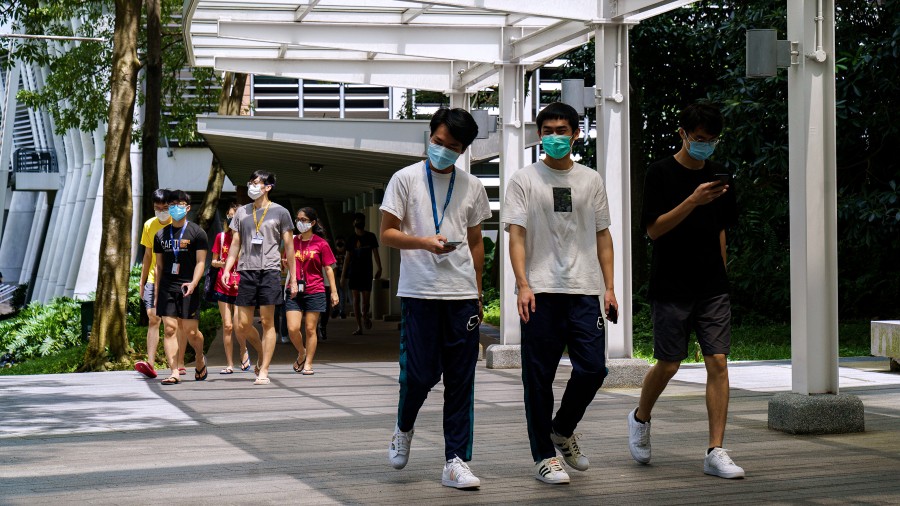Every day, Tan Eng Chye, president of the National University of Singapore (NUS), scans his online dashboard to see how crowded the cafeterias are. If the real-time map shows that one cafeteria is too packed, he has administrators send out an advisory to avoid it and to remind students that there are campus-run food delivery services, free of charge.
Following the government’s lead, universities in Singapore, a city-state of almost six million, have taken a top-down approach to managing the coronavirus. The result: since the start of the pandemic last year, not one person has been found to have contracted the virus at any of Singapore’s three major universities.
While the universities have benefited from a generally low caseload in Singapore’s broader population, their experience and stringent measures stand in stark contrast to many campuses across the US. A number of US universities experienced an explosion in cases almost as soon as students returned last fall.
NUS describes its strategy as containment, decongestion and contact tracing. The university has harnessed technology to enforce social distancing measures, assigned students to different zones on campus and imposed tough penalties for flouting the rules. Like some US colleges, it is testing people extensively and even sifting through sewage for traces of the virus. The goal, Tan said, “is to make sure there are no infections” among the students, faculty and staff members at NUS.
“We are very mindful that we are a big population of 50,000 just on campus. Whatever we do also has a bearing on the larger community outside the campus,” he said in an interview.
The relative safety of the three Singapore universities — NUS, Nanyang Technological University and Singapore ManagementUniversity — comes with certain trade-offs.
Kathlyn Laiu, a 19-year-old freshman who lives on the NUS campus, said the only party she attended last year was on Zoom, for Halloween. She spent her first semester eating most meals in her room, counting the number of people in the lounge before entering, and reporting her temperature twice a day through a university app.
The zoning restrictions made it complicated for students to access banking services, eat in their favorite cafeterias or organise meetings, though they could meet friends and classmates off campus.
“I think it’s quite hard to live with, honestly,” Laiu said. “It’s a very different idea of college.”
One major reason for Singapore universities’ success in keeping the virus at bay, experts say, is the aggressive pandemic response in society at large. The government offers free testing and medical care to all citizens and long-term residents, and it quickly isolates infected people and traces their contacts. It punishes those found to have violated restrictions, including by deporting foreign nationals and revoking work passes.
“We have not had any outbreak in the universities because the government has taken very good care of the policies,” said Rajesh Krishna Balan, an associate professor of information systems at Singapore Management University.
Singapore has had almost 59,000 coronavirus cases and 29 deaths, according to a New York Times database. Of those, 93 per cent were among migrant workers from South Asia, whose dormitories were the site of severe outbreaks.
Since those outbreaks were extinguished last fall, Singapore has averaged fewer than one locally transmitted case each day. On December 28, the country began its final phase of reopening, though migrant workers continue to live under harsher restrictions than the rest of the population.
As reopening proceeds, Singapore Management University is planning more face-to-face classes, while NUS has lifted its zoning restrictions. But the universities are also maintaining caution. Nanyang Technological University said it would offer free testing to all students returning to the dormitories this semester. Professors in Singapore say one major thread connects all three universities: a cooperative student population.
David Tan, vice-dean of academic affairs at the NUS faculty of law, noted that students at Harvard Law School had vocally opposed plans to hold classes online last fall. In contrast, he said, his students did not utter a word of protest.
“In Singapore, we just roll with it,” he said. “I think we are blessed with rather compliant students.”
Another advantage is that unlike in the US, most students in Singapore do not live on campus. Those who do must comply with more restrictions, such as limits on the number of visitors to their dormitories. Singapore also does not have fraternities and sororities, which on US campuses have hosted large parties that led to major outbreaks.
Olyvia Lim, a senior at Nanyang Technological University, said she and her classmates were baffled by reports about US college students partying amid a pandemic. “We all think ‘Why would they risk themselves to do such a thing'?” Lim said. “I think it’s culture. They are all about freedom, but when the government here says, ‘Wear a mask,’ we all do.”
Students say they comply because of the threat of punishment. Some of their classmates have been evicted for hosting visitors.
NYTNS










